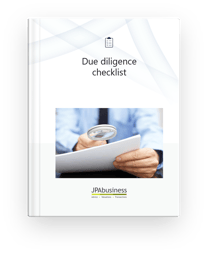
A successful business purchase is about doing your homework upfront and making sure you are well prepared.
In business circles this is called ‘doing your due diligence'.
You don’t want any nasty surprises after you take over – it's best to know about skeletons in the closet before it's too late to address them!
And if you know the risks before you jump (buy the business), then you can plan your landing (mitigate and manage the impact) during the business transfer.
A robust due diligence process should cover three core areas:
- Financial
- Commercial
- Legal.
For every business, the extent of focus and specific verification process in each of these three areas will vary.
Independent advice critical
In our eBook How To Get Good Staff and Keep Them, we said it’s best if, in assessing the quality of a potential employee, you have someone other than yourself involved.
Similarly, when looking at a business investment, it is critical that you engage someone you can trust for independent advice on the veracity and robustness of the business you’re looking to purchase.
That’s usually in the due diligence process and it might be a business advisor, accountant, solicitor, or all three.
We also often refer to the Business Buying Funnel.
The concept of the funnel is that as the funnel closes, you’re spending your valuable time and effort, and any investment in advice and assistance, on a business that has a close match with your requirements.
You’re not defraying those resources across a range of opportunities.
Using the JPAbusiness Due Diligence Checklist
As business advisors, we regularly prepare custom due diligence checklists for our business purchase clients.
We have created a simplified checklist which you can use to:
- help you conduct financial and commercial due diligence
- understand the basic requirements of legal due diligence
- recognise which documents you need to request from sellers and check them off as they are received.
Ask the right questions
Work through the due diligence process in an effective way, providing the vendor and their representative with an Information Request Checklist that is aligned to your Due Diligence Checklist.
Having confidence in the information you are provided about the business is critical right through the business purchase process and particularly in the due diligence phase.
Make sure everything critical to the value of the business, and the requirements you set right from the start, stacks up before you exchange a contract and pay a deposit.
Information – does it stack up?
The business purchase due diligence process is about checking and verifying information relating to the basic operations and performance of the business.
It’s not really about finding holes or gaps for the sake it, or in order to renegotiate the purchase price, terms or conditions.
It is about identifying risks, issues and any material differences between what has been represented in information provided previously on the business and what you or your advisor identify in due diligence process.
If this is the case there is an opportunity for you, as a purchaser, to vary your offer, terms and so on, to protect your risk.
2 key tips when conducting due diligence
- Watch for material discrepancies – Once I asked for some information on sales by key customer by month.
When I tried to tie the information back to overall sales reported in the financial statement, they were out by more than 20%.
During further queries I received three different reports responding to the same question, all with different sales figures.
I was left frustrated and lacking confidence as to the real position. - No information is a bad sign – If the business owner or their advisor is not willing to provide information in a timely manner to satisfy your due diligence requests, this is a sure sign something is wrong – caution is best!
Of course, if they simply can’t provide the information because they don’t record it in the format you want, then be flexible – there are often alternative ways to satisfy your analysis.
If the business owner is suggesting the information is commercially sensitive and therefore won’t provide it, again this might be a legitimate reason, but sometimes your query can be satisfied by sanitised summary information, or provision of remaining material post contract exchange.
If you would like assistance with conducting due diligence on a business purchase opportunity, contact the business advisory team at JPAbusiness on 02 6360 0360 for a confidential, initial discussion.
From the JPAbusiness Strategic Business Insights archive. Refreshed and checked for accuracy June 2017.
 James Price has over 30 years' experience in providing strategic, commercial and financial advice to Australian and international business clients. James' blogs provide business advice for aspiring and current small to mid-sized business owners, operators and managers.
James Price has over 30 years' experience in providing strategic, commercial and financial advice to Australian and international business clients. James' blogs provide business advice for aspiring and current small to mid-sized business owners, operators and managers.

